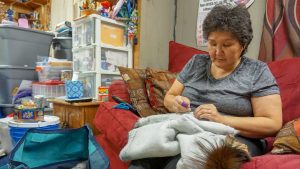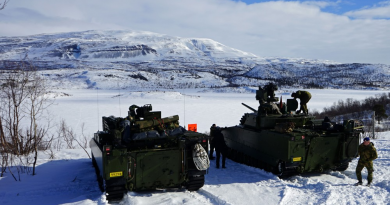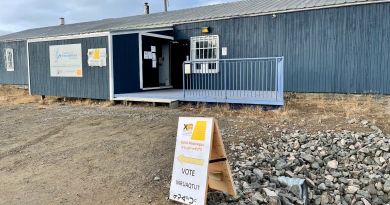Envisioning recovery and rebuilding a life in the Alaskan Arctic

Karen Mitchell is the Behavioral Health Aide in Noatak, a small village in the Northwest Arctic. Twenty-five years ago, as she stared out the window of her home there, such a future seemed impossible.
“I would look out the window, and one day I saw my uncle and his wife with their children going to church,” she recalled. “And I just start crying and wondering, ‘How can I have that kind of a family? Just you know walking together? As a husband, wife and child walking together.’”
That’s not what her life was like. She had kids and a husband, but Mitchell said they weren’t really a family because she drank too much. She started drinking heavily after her 11-year-old son was killed in a snow machine accident.
Whenever her other children or someone else in the village would mention her son who died, “I couldn’t handle it. So I just drank,” she said. “Drowned myself in alcohol… And I didn’t have any food in the table or in the cupboards or nothing to show for my family.”
Her husband had stopped using alcohol, but she kept going, even when he asked her to stop. Until the day she looked out the window at her uncle and his family.
Supportive surroundings
“I would picture them every time I drank, ‘I wish I could be that person. To be sober and have that kind of a life,’” Mitchell said. “I cried how many times to be that person, but my husband, I told him about it, and he said, ‘I think it’s time to quit.’”
About six years after her son died, she went to church on New Year’s Eve and said she was saved. She stopped drinking, but it wasn’t easy.
Mitchell said she needed them whenever her friends knocked on the door, asking her if she wanted a drink.
“I would say no. It was real hard, but I did it,” she said. “You have to have the will to try to. Don’t just do it overnight. You have to have to work on it.”
At that time she was working as a cashier at the store in Noatak, but she knew she wanted to do something that would help others. About six years after she stopped drinking, she saw a job posting for a behavioral health aide in the village.
“When I was working at the store in the morning, some people that used to go to the store and just hang out… and they would start talking about their problems,” Mitchell said. “And I would listen, listen to their problems. And then when I see that job opening then people would say, ‘Karen you should of fill out for this.’”
So Mitchell applied and got the job.
She remembered what it was like at first.
Focusing on values
“They just drop me off and like, ‘go to work,’ and I didn’t have no experience of anything. No experience of the computer or anything,” Mitchell said. “So I just sit and try to learn all by myself. But I use our values, our Inupiaq values to try to help our people.”
Mitchell said she focuses on values like learning about your ancestors, sharing with others and loving children and elders. Things she didn’t think about when she was drinking all the time and her kitchen cabinets were bare. Her life is different now.
“I know that I’m at peace. I know that I enjoy life more than I used to before,” she said. “I just love boating. I love picking berries. I love doing things now. It wasn’t there before that. It was just all alcohol, just staying home and being a drunk. From then, my life turned around where (now) I look in my freezer–sometimes I would look in my freezer and say, ‘Wow. I brought that home and I cut it up and put it in my freezer. That’s my food, what I brought home.”
Mitchell has worked as the behavioral health aide for 15 years.
Related links from around the North:
Canada: Jordin Tootoo, NHL’s first Inuk player, looks back on career and path to sobriety, CBC News
Finland: Finland’s alcohol consumption declines by 15%, YLE news
Sweden: Gender stereotypes behind high suicide rate, Radio Sweden
Russia: Why high suicide rates in Arctic Russia?, Deutsche Welle’s Iceblogger
United States: Indigenous Alaskans find strength in community and tradition, Alaska Public Media



